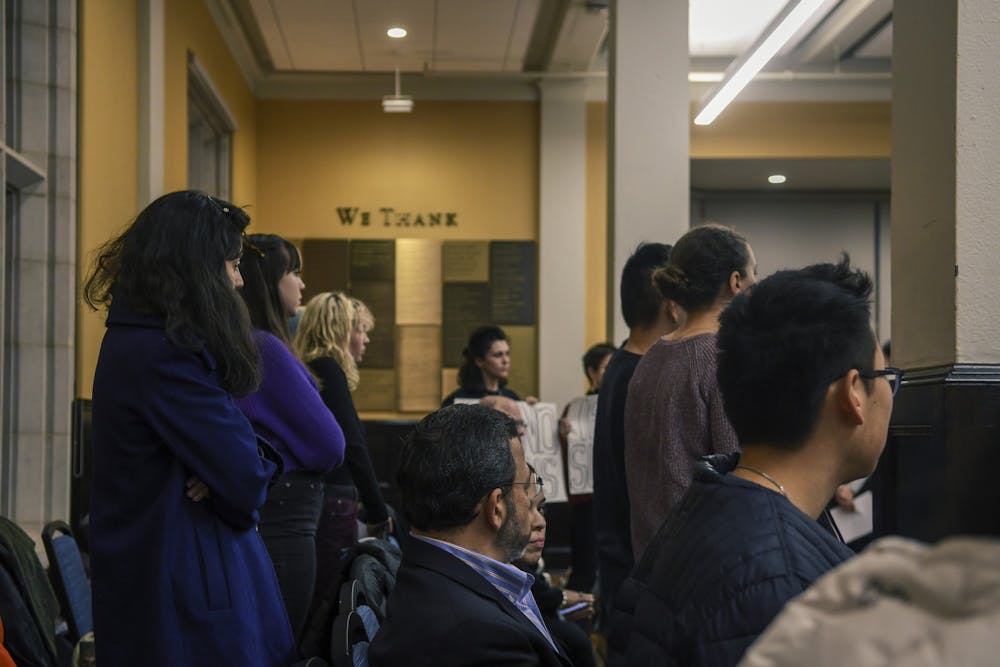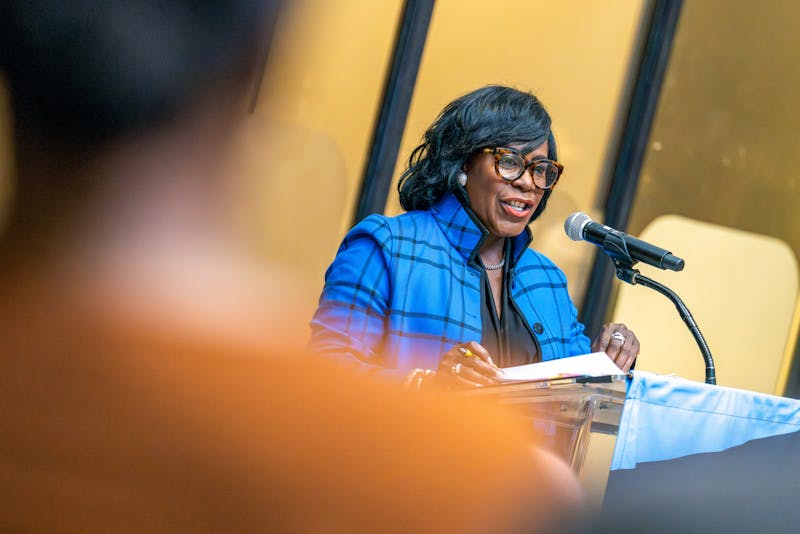
College senior Nyazia Bey said low-income areas, where many Penn students hail from, will be most detrimentally impacted by the climate crisis.
Credit: Mira ShettyStudent leaders called on Penn's administration at a University Council Open Forum Wednesday to respond to climate demands of campus activists to divest from fossil fuels and said administrators have ignored their public efforts and climate proposals over the last few years.
The open forum took place the same day Penn announced a new University-wide initiative to expand research on the climate crisis and recruit more faculty focused on sustainability. Yet, hours after the announcement, multiple students at the meeting still demanded urgent divestment from fossil fuels and called on administrators to decrease the University’s carbon emissions with urgency. Student leaders also said Penn has an obligation to better serve the vulnerable communities most severely harmed by the impending climate crisis. Nine students stood up and read critical statements in front of top administrators, including Penn President Amy Gutmann and Provost Wendell Pritchett.
Also at the meeting, a representative of the Coalition Against Fraternity Sexual Assault, College senior Brennan Burns, spoke about fraternity life and sexual assault on campus. On behalf of CAFSA, Burns demanded that Penn remove fraternities from their on-campus locations and that the University fill those spaces with Penn’s cultural and wellness centers.
Burns read anonymous testimonials submitted by Penn students about sexual harassment experiences with fraternity brothers in fraternities both on and off Locust Walk. These testimonies are also published on the CAFSA website.

College senior Jordan Andrews stood in solidarity with the students who spoke on climate issues at the meeting.
Speakers discussed the disproportionate impact that the climate crisis has on poor communities. College senior Nyazia Bey said low-income areas that many Penn students are from, including the poorest parts of Philadelphia, will be most harmed by the climate crisis. In these communities, families often do not have the money to repair their homes devastated by forest fires, drought, and hurricanes caused by climate change.
She requested a formal council where students and faculty, at least one of whom she hopes will be first-generation, low-income, could engage in meaningful conversation with the administration.
“Right now, there is no direct path for concerns on climate to be brought up directly to administration, and that needs to change. This climate crisis will quickly spiral into an emergency. Unless we as a collective start acting with absolute urgency, it will be too late and the blood will be on our hands," Bey said.
There were five designated student speakers who demanded climate-specific change, and a group of students wearing green armbands stood in silent solidarity with them each time they addressed the administrators.

Nine students stood up and read critical statements in front of top administrators, including Penn President Amy Gutmann and Provost Wendell Pritchett.
Fossil Free Penn coordinator and College senior Claudia Silver said FFP had submitted two divestment proposals in the past year. Though both plans received "demonstrated support" from students, they were rejected by the administration without explanation. She also criticized the University's lack of acknowledgment of Fossil Free Fridays and requests for a public town hall on divestment. FFP has been holding sit-ins every Friday outside of the President's Office in College Hall demanding a conversation on divestment.
College junior Elliot Bones demanded that Penn educate its students on climate grief, the emotional toll the climate crisis takes on a person and community. Bones requested that Penn train climate therapists and promote students’ climate literacy by increasing environmental course offerings.
Bones said Penn will not be able to address his grief until the administration enacts "a climate action plan that isn’t disgracefully inadequate and doesn’t incinerate trash that will go into the air that [his] students breathe, and by divesting from the genocidal fossil fuel industry."

Students throughout the audience stood in solidarity with their peers who spoke on climate issues.
Climate Reality Project Co-chair and Wharton senior Kalyxa Roman compared Penn to its peer institutions that have already committed to carbon neutrality or to use renewable energy resources to run campus operations.
Though Penn’s Climate and Sustainability Action Plan has stated that the University is on track to be partly neutral by 2042, it falters in comparison to promises other universities have made, Roman said. She demanded that Penn be carbon neutral by 2030 and that the administration publish a detailed plan for a 100% renewable energy-run campus. Stanford University has committed to use 100% renewable electricity by 2021.
“Look us in the eyes, acknowledge our fears, and make a stronger promise to address this emergency,” Roman said.
Other statements also included requests to the University to fire Penn Law School professor Amy Wax over her controversial statements and to address concerns regarding graduate students’ untimely stipends and high taxes. Seventh-year sociology Ph.D. student Sonita Moss said that her stipend has been taxed higher without explanation from administrators after the recent launch of WorkDay at Penn, a new payroll system.
Pritchett declined to comment when approached by a Daily Pennsylvanian reporter after the event.
Correction: A previous version of this article incorrectly stated that Penn's peer institutions have divested from fossil fuels when, in fact, they have not. The DP regrets this error.
The Daily Pennsylvanian is an independent, student-run newspaper. Please consider making a donation to support the coverage that shapes the University. Your generosity ensures a future of strong journalism at Penn.
Donate






